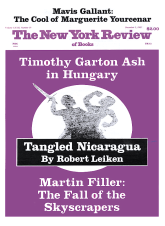In response to:
The Prospects of Nuclear War from the August 15, 1985 issue
To the Editors:
In his review of my essay on accidental nuclear war in the review “Hawks, Doves, and Owls” [NYR, August 15] Lord Zuckerman almost completely misrepresents my views. I believe that the danger of accidental and inadvertent war is considerable during a crisis involving the United States and the Soviet Union. When nuclear forces are alerted the risk of unanticipated actions and interactions becomes extremely dangerous. In peacetime when there is no crisis I feel that these risks are minimal. Unfortunately, our conception of the dangers of inadvertent war are formed in peacetime, creating an unjustified complacency about the ability of government to control events during a crisis.
Paul Bracken
Yale University
Lord Zuckerman replies:
I am not sure that I understand the distinction which Admiral Lee makes between his and my views. We seem to agree that nuclear weapons cannot with confidence be treated as weapons of war, and that they consequently have no military, as opposed to political, utility. Both of us know that it is nonetheless NATO doctrine that if all else failed, they would be used to stem an attack by Warsaw Pact forces, which in theory means that they would be used if the mere deployment of nuclear warheads turned out to be an ineffective deterrent which, in Admiral Lee’s terms, would mean that extended deterrence had failed. In short, may I therefore express the hope that there never will be an occasion for testing the doctrine of extended deterrence in practice. Years ago, in the period when I was an official of the British government, I was given permission by the then Supreme Commander of NATO to challenge publicly the NATO belief in the military utility of nuclear weapons. As I put it then, nearly twenty-five years ago, nuclear weapons were there to deter; if used, they could not be relied upon to defend.
Mr. Bracken also confuses me. In my review I referred first to his belief (indicated on three occasions in his chapter on accidental nuclear war) that “pure” accidental war is now a “virtual impossibility.” I contrasted this view with the less reassuring one of Daniel Ford, as spelled out in his book, The Button. I then commented on Mr. Bracken’s concern lest maritime accidents escalated to nuclear disaster, and on his statement that what was needed was a continual channel of communication between the American and Russian authorities. I noted his admonition that the United States should concentrate its energy on preventing confrontations, and on the establishment of “design principles and rules of the road” to deal with periods of intense crisis. And I also mentioned his belief that Britain, France, and China have given less thought to the matter of crisis management than has the United States. In short I cannot see how anything I wrote “almost completely” misrepresented his views which, so far as I now understand from his letter, add up to the not very profound statement that the danger of nuclear disaster becomes more acute in periods of crisis than in times of peace. If Mr. Bracken wishes me to agree with this observation, I do so willingly.
This Issue
December 5, 1985



